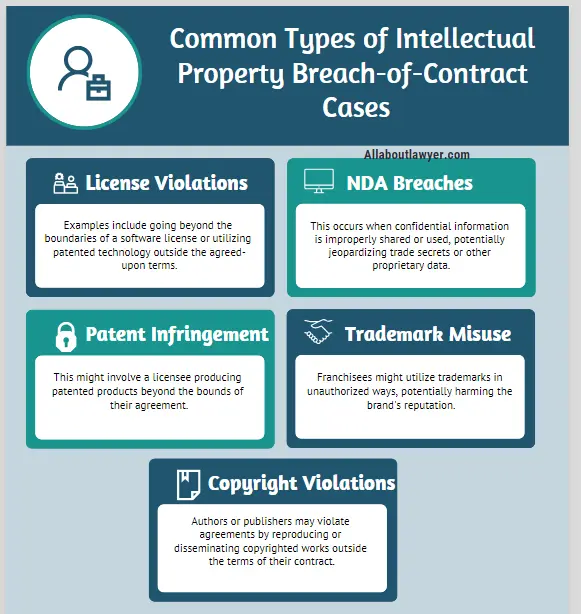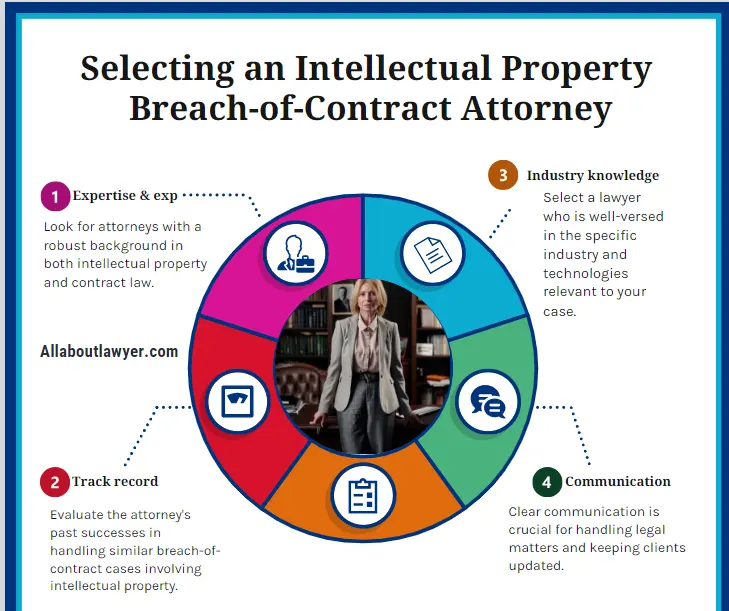Intellectual Property Breach-of-Contract Attorneys
Intellectual property (IP) represents the intangible creations of human intellect, encompassing patents, trademarks, copyrights, and trade secrets. These valuable assets are often subject to various contractual agreements that govern their use, licensing, and protection. When these agreements are violated, it falls under the intellectual property breach-of-contract, a complex area where IP law intersects with contract law. That’s when you need an Intellectual property breach-of-contract attorney.
Table of Contents
Importance of specialized attorneys in IP breach-of-contract cases
Given the intricate nature of both IP and contract law, attorneys specializing in IP breach-of-contract cases play a crucial role in protecting innovation and enforcing agreements. These legal professionals possess the unique combination of expertise required to navigate the complexities of IP rights while addressing the nuances of contract law.
Understanding Intellectual Property Breach-of-Contract
A. Types of intellectual property
1. Patents: Exclusive rights granted for inventions
2. Trademarks: Distinctive signs identifying goods or services
3. Copyrights: Rights given to creators of original works
4. Trade secrets: Confidential business information
B. Common IP contract types
1. Licensing agreements: Permit others to use IP for defined purposes
2. Non-disclosure agreements (NDAs): Protect confidential information
3. Assignment agreements: Transfer ownership of IP rights
C. Definition and examples of IP contract breaches
An IP contract breach occurs when one party fails to adhere to the terms of an agreement involving intellectual property. Examples include:
1. Using licensed technology beyond the scope of the agreement
2. Disclosing confidential information protected by an NDA
3. Failing to pay royalties as stipulated in a licensing contract
Role of an Intellectual Property Breach-of-Contract Attorney
A. Legal expertise in both IP and contract law
IP breach-of-contract attorneys possess comprehensive knowledge of both intellectual property laws and contract principles, allowing them to effectively address the unique challenges these cases present.
B. Case evaluation and strategy development
These specialists assess the strength of a case, identify potential legal issues, and develop tailored strategies to achieve the best possible outcome for their clients.
C. Negotiation and dispute resolution
Attorneys often engage in negotiations to resolve disputes without resorting to litigation, potentially saving time and resources for their clients.
D. Litigation representation
When necessary, IP breach-of-contract attorneys represent their clients in court, arguing complex legal points and presenting evidence to support their case.
E. Preventive legal counsel
These lawyers also provide valuable advice on drafting and reviewing IP contracts to minimize the risk of future breaches.
Common Types of IP Breach-of-Contract Cases
A. License agreement violations
Examples include exceeding the scope of a software license or using patented technology outside agreed-upon terms.

B. Non-disclosure agreement breaches
These occur when confidential information is improperly shared or used, potentially compromising trade secrets or other proprietary data.
C. Patent infringement in contractual contexts
This may involve a licensee manufacturing patented products beyond the terms of their agreement.
D. Trademark misuse in franchise agreements
Franchisees might use trademarks in ways not permitted by their franchise contract, potentially damaging the brand’s reputation.
E. Copyright violations in publishing contracts
Authors or publishers may breach agreements by reproducing or distributing copyrighted works outside the terms of their contract.
Legal Process for IP Breach-of-Contract Cases
A. Initial case assessment
Attorneys evaluate the strength of the case, gathering evidence and reviewing relevant contracts and IP registrations.
B. Cease and desist letters
Often, the first step is sending a formal notice to the breaching party, demanding they stop the offending activity.
C. Alternative dispute resolution (ADR)
Many cases are resolved through mediation or arbitration, which can be faster and less costly than litigation.
D. Filing a lawsuit
If ADR is unsuccessful or inappropriate, the attorney may file a lawsuit in the appropriate court.
E. Discovery and pre-trial procedures
This phase involves exchanging information, taking depositions, and filing motions to shape the upcoming trial.
F. Trial and appeals process
The case is presented before a judge or jury, with the possibility of appeals following the verdict.
Remedies for IP Breach-of-Contract
A. Monetary damages
Compensation for financial losses resulting from the breach, including lost profits and royalties.
B. Injunctive relief
Court orders requiring the breaching party to cease infringing activities.
C. Specific performance
Requiring the breaching party to fulfill their contractual obligations.
D. Contract termination
Ending the agreement due to the breach, potentially with additional penalties.
E. Punitive damages in egregious cases
Additional monetary penalties in cases of willful or malicious breaches.
Challenges in IP Breach-of-Contract Cases
A. Complexity of IP laws
The intricate nature of intellectual property laws like kentucky property right of way laws can make these cases particularly challenging.
B. Technological aspects of IP
Many cases involve complex technologies, requiring attorneys to understand both legal and technical aspects.
C. Jurisdictional issues in global IP contracts
International agreements may involve multiple jurisdictions, complicating legal proceedings.
D. Balancing innovation protection with fair use
Cases often require careful consideration of IP protection versus principles of fair use and competition.
Preventing IP Breach-of-Contract
A. Drafting robust IP contracts
Well-crafted agreements can minimize the risk of misunderstandings and breaches.
B. Regular contract audits and compliance checks
Periodic reviews ensure all parties are adhering to contractual terms.
C. Employee training on IP protection
Educating staff about IP rights and contractual obligations can prevent inadvertent breaches.
D. Implementing security measures for trade secrets
Proper safeguards help maintain the confidentiality of valuable business information.
Selecting an Intellectual Property Breach-of-Contract Attorney
A. Relevant expertise and experience
Look for attorneys with a strong background in both IP and contract law.
B. Track record in similar cases
Consider the lawyer’s history of success in handling comparable IP breach-of-contract cases.
C. Understanding of your industry and technology
Choose an attorney familiar with the specific sector and technologies involved in your case.
D. Communication skills and responsiveness
Effective communication is crucial for navigating complex legal issues and keeping clients informed.

Costs Associated with IP Breach-of-Contract Cases
A. Attorney fee structures
These may include hourly rates, contingency fees, or a combination of both.
B. Litigation expenses
Costs for court filings, expert witnesses, and other legal proceedings can be significant.
C. Expert witness fees
Technical experts often play a crucial role in IP cases, adding to overall expenses.
D. Potential for fee shifting in IP cases
Some IP laws allow for the prevailing party to recover attorney fees from the losing side.
Recent Trends in Intellectual Property Breach-of-Contract Law
A. Impact of digital technologies on IP contracts
The rise of digital platforms and technologies has introduced new challenges in IP contract enforcement.
B. Evolving case law in IP breach cases
Recent court decisions continue to shape the interpretation of IP contracts and breach cases.
C. International considerations in global IP agreements
Increasing globalization has led to more complex cross-border IP contracts and potential breaches.
Conclusion
Intellectual property breach-of-contract cases represent a critical intersection of innovation protection and contractual obligations. As the value of IP continues to grow in our knowledge-based economy, the role of specialized attorneys in this field becomes increasingly vital. These legal professionals not only help resolve disputes but also play a crucial role in preventing breaches through careful contract drafting and proactive legal counsel.
By understanding the complexities of IP breach-of-contract cases and seeking appropriate legal representation, individuals and businesses can better protect their innovative assets and ensure compliance with their contractual agreements. As technology and global commerce continue to evolve, the expertise of IP breach-of-contract attorneys will remain essential in navigating this complex and dynamic legal landscape.
FAQs
A. What constitutes a breach of an IP contract?
A breach occurs when one party fails to fulfill their obligations under an IP agreement, such as unauthorized use of licensed technology or failure to pay royalties.
B. How long do I have to file an IP breach-of-contract lawsuit?
The statute of limitations varies by jurisdiction and type of IP, typically ranging from 2 to 6 years. Consult an attorney promptly to ensure timely filing.
C. Can I handle an IP breach-of-contract case without an attorney?
While possible, it’s not advisable due to the complex nature of IP and contract law. Professional legal representation significantly improves your chances of a favorable outcome.
D. What damages can I expect in an IP breach-of-contract case?
Damages may include lost profits, royalties, injunctive relief, and in some cases, punitive damages. The specific amount depends on the nature and extent of the breach.
E. How can I protect my IP in international contracts?
International IP protection requires careful contract drafting, consideration of relevant laws in all jurisdictions involved, and potentially registering your IP rights in multiple countries. Consult with an attorney experienced in international IP law for comprehensive protection.
For more such articles visit AllAboutLawyer.com
About the Author

Sarah Klein, JD, is a former civil litigation attorney with over a decade of experience in contract disputes, small claims, and neighbor conflicts. At All About Lawyer, she writes clear, practical guides to help people understand their civil legal rights and confidently handle everyday legal issues.
Read more about Sarah
